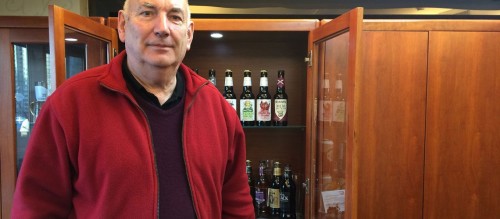When President Xi Jinping shared a pint of beer with British Premier David Cameron at a Buckinghamshire pub during his state visit in October, the gesture reverberated across the continents. It stirred curiosity about beer and flushed some business owners with cash.
The local pub, The Plough at Cadsden, a longtime favorite of Cameron’s, is now a destination for hundreds of Chinese tourists.
People back home also demanded to taste the beer Xi seemed to be enjoying. Greene King IPA, the beer savored by the two world leaders, has seen a rise in Chinese exports of 1,600 percent, and an 8.5 percent uptick in share value in December – the highest in a decade.
 In Beijing, British businessman Peter Bloxham mused at how the seemingly innocuous event affected his business. Bloxham’s company PFB Trading imports Greene King IPA and other British beer into China. After the Buckinghamshire toast, orders started pouring in from around the country: hotels, restaurants and distributors all wanted the IPA. The phone didn’t stop ringing for two days.
In Beijing, British businessman Peter Bloxham mused at how the seemingly innocuous event affected his business. Bloxham’s company PFB Trading imports Greene King IPA and other British beer into China. After the Buckinghamshire toast, orders started pouring in from around the country: hotels, restaurants and distributors all wanted the IPA. The phone didn’t stop ringing for two days.
“We’d become multimillionaires if it went on like this because it’s just crazy. Absolutely crazy,” Bloxham said from his office across the street from the Beijing Workers’ Stadium.
Bloxham, who first came to China in 1994 and has since decided to make it his permanent home, sees the country as a land of opportunity. He’s found a welcoming market for both his businesses, which are related to agri-food education and British food imports.
Agri-Food Education
Twenty-two years ago, the Chinese government financed an environmental project to improve water quality on the Beijing plain. They brought in specialists from Britain. Bloxham, who was the head of engineering at Harper Adams University, an agri-food school in Shropshire, came to Beijing for numerous short trips over the next four years.
Toward the end of the project, he liked it so much in China that he wanted to stay. He moved to Beijing in 2000 to set up joint degree programs in food quality retail and international business at Beijing University of Agriculture. Today, students who enroll in these programs study for three years in Beijing and for one year at Harper Adams. About 80 Chinese students live on the UK campus every year.
At first, Bloxham lived on the Beijing University of Agriculture campus. He remembers the rooms had no heating and that selling agri-food education in China was tough.
“People associated agri-food with peasants’ work. It was difficult to recruit students,” Bloxham said.
But the programs gradually grew, along with the agri-food industry in China. Bloxham has also helped set up partnerships with China Agricultural University, Dalian Polytechnic University in Liaoning province and Huazhong Agricultural University in Hubei province.
In 2004, he set up his own consultancy company, PFB Associates, and later the import firm PFB Trading. He imports British beers, ciders and cheese.
Beer
In the mid-2000s, like now, the Chinese beer market was dominated by local light lager brands such as Yanjing, Snow and Tsingtao. The imports were mostly German beers. The import firm Vandergeeten had started selling premium European beers in China, such as Hoegaarden, Leffe and Boddingtons. In 2008, Shanghai-based DXCEL International started bringing in craft beers from American breweries such as Rogue and North Coast Brewing.
But the prices were high and sales were difficult, said Roy Locke, product supervisor at DXCEL International. There wasn’t a Chinese term to describe craft beer, and the sales were highly dependent on expats.
The market has evolved since, but according to industry experts, craft beers still make up less than 1 percent of the Chinese beer market, estimated at 486 billion yuan in 2014.
Bloxham too struggled with selling the British beer on the Chinese market. Beside Greene King IPA, he imports other brands such as Old Speckled Hen, Belhaven and Abbot Ale, as well as ciders and ginger beer.
But Xi’s drinking of IPA has given a boost to his business. In December he was waiting for three shipments totaling 75,000 bottles of Greene King IPA to reach the port of Tianjin, up from about 6,000 bottles of beer and cider that Bloxham used to import monthly.
“I think after Spring Festival we’ll get back to normality, but our sales will go up by then,” Bloxham said.
The Britishman has decided a while ago he wants to make China his permanent home. To that end, he’s sold his properties in the UK. He says he’s always felt welcome in China, even though he sometimes experiences annoyances, which he’s learnt to accept.
“I’ve never felt anything that made me feel I want to get away from here,” he said. “It’s a land of opportunity, but you have to go with the flow; it’s not worth fighting it.”

